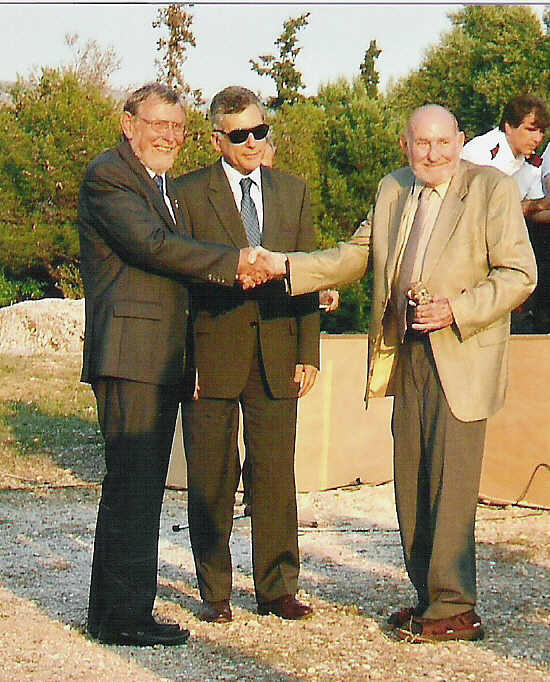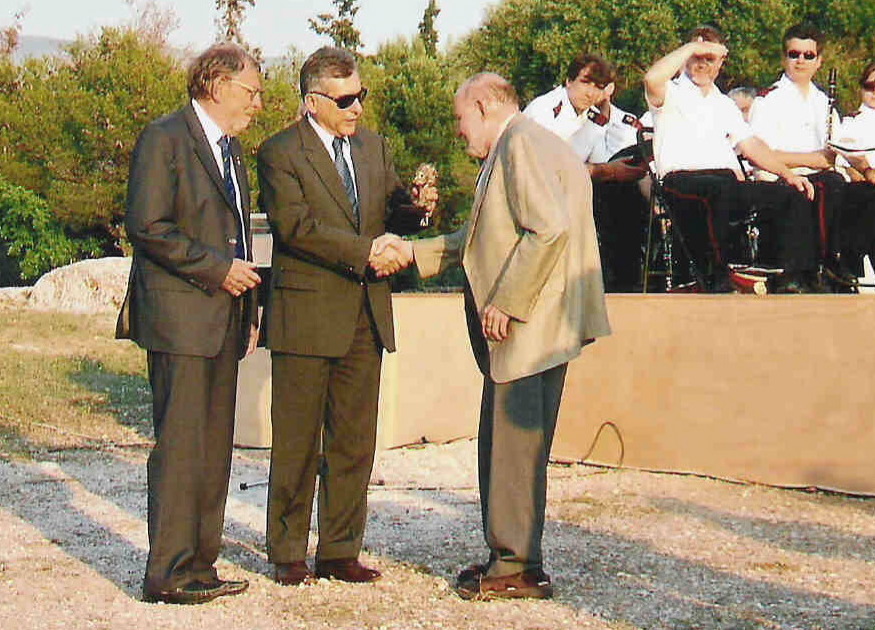
Contact Information
Dr Young receives Lifetime Distinguished Scholar Award |
Professor of Classics, University of Florida, 1989-Previous: Univ. of California, Santa Barbara (1963-1989)
Other: Visiting Professor of Classics, Stanford Univ., l974, 1976;
Univ. of Michigan, Ann Arbor, 1973, 1983
B.A., University of Nebraska, 1959 (Greek; Distinction, Phi Beta Kappa), Ph.D. (Classics), University of Iowa (Co-operative degree with Minnesota & Wisconsin), 1963.
PUBLICATIONS ON GREEK LITERATURE (excludes reviews, abstracts, etc.)
'Pindaric Criticism,' Minnesota Review 4 (1964), 584-641.
'Sophocles Ajax 516,' Classical Philology 61 (1966), 249f.
Three Odes of Pindar: A Literary Study of Pythian 11, Pythian 3, and Olympian 7, E.J. Brill, Leiden, 1968
Reviews: Class. World 63 (1970) 51 (Robertson); Phoenix 25 (1971) 70-73 (Slater); Antiquité Classique 38 (1969) 542f. (Lasserre); Schweiz. Altphilologenband, Bulletin 2 (1972) (Lauer); Gnomon 42 (1970) 441-445 (Mþhler); Athenaeum 48 (1970) 209-214 (Castagna); Bol. d. Inst. d. Estud. helen., Barcelona 4 (1970) 69f. (Alsina); Riv. di studi clas. 22 (1974) (D'Agostino) (cf. Salvaneschi, below).
'Pindaric Criticism,2' pp. 1-95 in Wm. Calder III & J. Stern, edd., Pindaros und Bakchylides, Wissenschaftliche Buchgesellschaft, Darmstadt, 1970 (Wege der Forschung)
(Revised version of first item above) Review: Class. Review 23 (1973) 131f. (Willcock).
(cf. Salvaneschi, below).
'Pindar Nemean 7: some preliminary remarks,' Transactions and Proceedings of the American Philological Association 101 (1970), 633-643.
'A Note on Pindar Nemean 7.31f.', California Studies in Classical Antiquity 4 (1971), 249-253
'Pindar Isthmian 7, Myth, and Exempla, E.J. Brill, Leiden, 1971
Reviews: Class. Rev. 24 (1974) 14-16 (Willcock); Riv. di studi clas. 23 (1975) 155f. (d'Agostino); Mnemosyne 27 (1974) 303-5 (Radt); Ant. Clas. 42 (1973) 596f. (Lasserre); Gnomon 45 (1973) 197-9 (Slater); Emerita 40 (1972) 528-30 (Lopez); Journal of Classical Studies of Japan 23 (1975) 81-84 (Ito) (cf. Salvaneschi, below)
'The text of Pindar Isthmian 8.70,' American Journal of Philology 94 (1973), 319-326
'Pindar's Style at Pythian 9.87f.,' Greek, Roman and Byzantine Studies 20 (1979), 133-143
"The Diachronic Study of Myth, and Achilles' Heel," Journal of the Calif. Classical Association, 4 (1979), 3-34
'Pindar,' pp. 157-177 in T.J. Luce, ed., Ancient Writers: Greece and Rome, Scribner's, New York, 1982
'Crazy Horse on the Trojan Plain: A Comment on the Classicism of John G. Neihardt ,' Classical and Modern Literature 3 (1982), 45-53
'Pindar Pythians 2 and 3: Inscriptional pote and the 'Poetic Epistle',' Harvard Studies in Classical Philology 87 (1983), 31-48
'Pindar, Aristotle, and Homer: A Study in Ancient Criticism,' California Studies in Classical Antiquity 13 (1983), 156-170
'Pindar and Horace against the Telchines (Ol. 7.53 and Carm. 4.4.33),' American Journal of Philology 108 (1987) 152-157
'Neihardt's Classicism in The Song of Three Friends,' The Nebraska Humanist 11 (1989). 10-25
'Praxinoa's Speech and the Text of Theocritus 15.15-17,' Classical Philology 87 (1992), 134-137
''Something like the Gods': A Pindaric Theme and the Myth of Nemean 10,' Greek, Roman and Byzantine Studies, 34 (1993), 123-132
PUBLICATIONS ON OLYMPICS AND ATHLETICS
"Croton and the Games," Journal of the California Classical Association, 2 (1977), 2-16
'Professionalism in Archaic and Classical Greek Athletics, Ancient World 7 (1983), 45-51
The Olympic Myth of Greek Amateur Athletics, Ares, Chicago, 1984. Reviews: Arizona Republic, July 22, 1984 (Hermann); San Diego Tribune, July 30, 1984 (Kaiser); Journal of Sport History 11 (1984), 111-113 (Kyle); Journal of Hellenic Studies 106 (1986), 238-239 (Instone); Classical Journal 82 (1987), 268-271 (Evjen); Classical World 80 (1987), 456 (Traupman); Sportwissenschaft 17 (1987), 100-102 (Weiler); Echos du monde classique 29 (1985), 134-144 (Kyle); American Journal of Philology 110 (1989), 166-171 (Poliakoff)
'The Ancient Olympics and the Fine Arts,' Proceedings of the Xth U.S. Olympic Academy, C.R. Paul, ed., pp. 150-155, United States Olympic Committee, Colorado Springs, 1986
'Athletics,' in Michael Grant, ed., Civilization of the Ancient Mediterranean, II, 1131-1142, Scribner's, New York, 1988
'The Origins of the Modern Olympics: A New Version,' International Journal of the History of Sport 4 (1988 ['1987']), 271-300
'Demetrios Vikelas, First President of the IOC,' Stadion: International Zeitschrift fŸr Geschichte des Sports, 14 (1988), 85-102.
'Professionalism in Archaic and Classical Greek Athletics,2' J.D. Segrave & D. Chu, eds., The Olympic Games in Transition, pp. 27-35, Human Kinetics Publs., Champaign, IL, 1988 (revised reprint of 1983 item above)
'How the Amateurs won the Olympics,' W.J. Raschke, ed., Archaeology of the Olympics, pp. 52-72, Univ. of Wisconsin Press, Madison, 1988
'The Riddle of the Five Rings,' Coroebus Triumphs (Proceedings of the First Annual Meeting of the Sport Literature Association), S. Bandy, ed., pp. 257-276, San Diego, 1989
'Modern Greece and the Origins of the Modern Olympic Games,' W. Coulson and H. Kyrieleis, edd., Praktika; Symposiou Olympiakon Agonon. 5-9 Septembriou 1988, pp. 175-184, Deutsches Archþologisches Institut, Athens, 1992
'Myths and Mist surrounding the Revival of the Olympic Games: the Hidden Story,' in F. Landry, ed., Sport...Le troisime millŽnaire, pp. 100-115, Proceedings of the International Symposium, Quebec City, University of Laval Press, 1991
''It is more important to participate than to win'; Who said it first, Coubertin, Bishop Talbot, St. Paul, or Ovid?' Olympika: The International Journal of Olympic Studies 3 (1994), 17-25
'Myths about the Ancient Games,' Archaeology 49, No. 4 (July/August, 1996), 30
The Modern Olympics: A Struggle for Revival, Johns Hopkins University Press, Baltimore, 1996 (xviii, 252 pp), reprint 2001. Reviews: Olympika. The International Journal of Olympic Studies, 6 (1997), 121-128 (Barney); Choice 34 (1997), 76; (McGehee); Journal of Olympic History, 5.3 (1997), 40-42 (Hill); Journal of Sport History 24 (1997), 433-4 (Edmonds)
'First with the Most: Greek athletic records and 'Specialization,'' Nikephoros. 'Zeitschrift fŸr Sport und Kultur im Altertum 9 (1996 [1997]), 3-25.
'More on the Olympic Maxim, 'It's more important....': Its use in 1896--and 1894 and 1908,' Journal of Olympic History 7.3 (1998), 26-31.
'Further Thoughts on Some Issues of Early Olympic History,' Journal of Olympic History 6.3 (1998), 29-41.
'That Memorable First Marathon,' Journal of Olympic History 7.1 (1999), 5-24 (co-authored with Anthony Th. Bijkerk).
'How the Amateurs won the Olympics,'2 W.K. Rashke, ed., Archaeology of the Olympics, pp. 52-72, Univ. of Wisconsin Press, Madison (2nd edition, updated), 2002
"The Roots of our Olympic Games," pp. 18-40 in: Lindsay Adams and Larry Gerlach, editors, The Winter Olympics: From Chamonix to Salt Lake City, Salt Lake City (Univ. of Utah Press), 2004
A Brief History of the Olympic Games, Oxford (Blackwell Publishing), 2004 (xvi & 194 pp.). Reviews: Journal of Hellenic Studies 125 (2005), 149-143 (Kšnig); (Journal of Sport History 31 (2005), 352-354 (Kyle); The Historian 67, 819-820, (2005) (Crowther)
'With Hands or Swift Feet,' Natural History 184 (2004), 24-30.
'Pos to Olympia tou 776 egine e Athena tou 2004,' (Manos Mikelakis, transl.) pp, 158-161,: in Dimitrios Garophalis, editor, Ta Stadia stin archea Ellada, special Edition of Corpus, Athens, 2004 (Ministry of Culture),. Athens, August 2004
'From Olympia 776 BC to Athens 2004: Origin and Authenticity of the Modern Games," pp. 1-26 in: Kevin Wamsley and Kevin Young, editors, Olympic Journeys, Elsevier Press, London, 2005 (=Vol. 3 of series Research in the Sociology of Sport)
'Mens sana in corpore sano? Body and Mind in Ancient Greece.' International Journal of the History of Sport 22, No. 1 (2005), 22-41
'The Olympic Games,' Encyclopedia Britannica, electronic edition, 70 pp., 2006 (greatly expanded and largely rewritten version of existing EB article on Olympics)
'The Olympic Truce,' Encyclopedia Britannica, electronic edition, pp., 2006
"Evangelis Zappas: Olympian Sponsor of Modern Olympic Games,' Festschrift Wolfgang Decker, special issue of Nikephoros. 'Zeitschrift fŸr Sport und Kultur im Altertum 18, 2005 (2006), 273-288
'Dimitrios Vikelas and Pierre de Coubertin: A Partnership of Destiny,' Journal of Olympic History 15 (2007), 24-27
_______________________________________________________
Popular and non-refereed items: eight items on the Olympics in USA Today. California Magazine, and The Los Angeles Times.
'Words of Pindar,' translation by D.C. Young and F.J. Nisetich, read by Richard Basehart, Closing Ceremony, Los Angeles Olympic Games, 1984
Articles on: E. Salvaneschi, "La critica Pindarica di D.C. Young," La Parola del Passato 147 (1972), 426-437
G. Redmond and D. Kyle, "Young's Olympic Myth," Arete: The Journal of Sport Literature 2 (1985), 201-207
Lectures / Papers: More than one hundred lectures and papers, including lectures at the universities of Texas, Stanford, Michigan, Colorado, Pennsylvania, Iowa, Southern California, Nebraska, Georgia, Vanderbilt, Georgia Tech, Louisiana State, Utah, Indiana, Western Ontario, Laval (Quebec), Missouri. Akron, UC Berkeley, UCLA, UC Santa Cruz, UC Irvine, UC Davis, San Diego State, Florida State, Hellenic College, Wellesley College, Columbia, Yale; Oxford and Cambridge, England; also in Koeln, Germany, Athens, Olympia, and Veria, Greece, and Glasgow, Scotland
Lecturer, International Olympic Academy, Ancient Olympia, Greece, 1991, 1992, 1997, 2007
Media interviews: more than 100 interviews given, press, radio, and television.
Member: Archaeological Institute of America; American Philological Association, Classical Association of Middle-West and South; International Society of Olympic Historians; North American Society for Sport History, International Olympic Academy, Olympia, Greece, Delegate from USA, 1986
Teaching Specialties: First Year Greek, Greek Poetry, especially Lyric
Dr. Young receiving the top award of the International Society of Olympic Historians
|
Awards:
Distinguished Teacher Awards, Univ. of Calif., Santa Barbara, 1988; Univ. of Florida 1992, 1996
Olympic Book of the Year Award (for The Olympic Myth of Greek Amateur Athletics), Education Council, United States Olympic Committee, 1989
'Lifetime Distinguished Scholar' Award for 2007, International Society of Olympic Historians, Athens and Olympia Greece, June 2007

